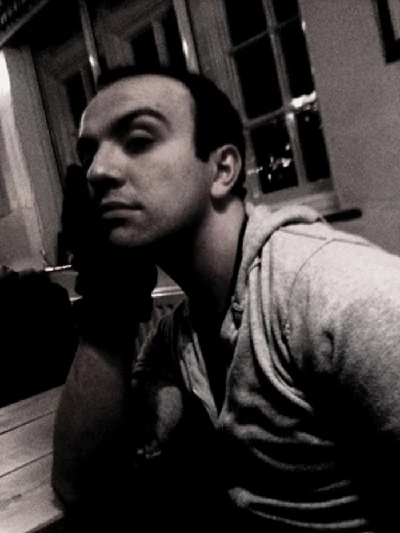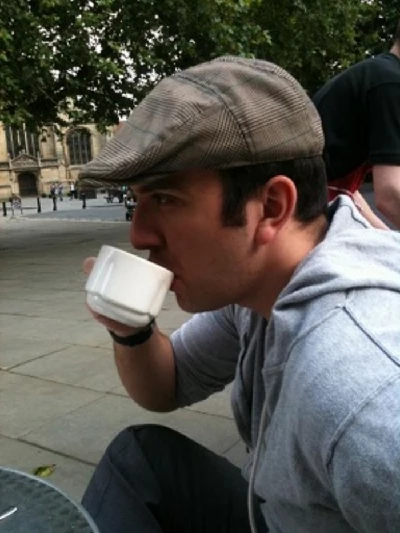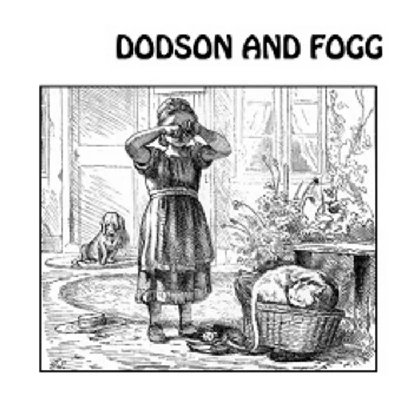published: 6 /
12 /
2012

Malcolm Carter speaks to author and musician Chris Wade about his group Dodson and Wade, and its self-titled and psychedelic-influenced debut album
Article
The illustration on the CD inlay of Dodson and Fogg’s self-titled debut album is captivating. A sad young girl standing outside a house, her pets around her and her hat and doll strewn on the floor has a distinct old-fashioned feel about it. Something keeps pulling you back for yet another look. It’s a little unsettling yet strangely comforting and compelling.
Which is a lot like the music on the album. Dodson and Fogg is the name Chris Wade, an extremely talented fellow still in his twenties, has given to his latest project. Wade’s website www.wisdomtwinsbooks.weebly.com gives more details of just how many projects this illustrator, author, musician and editor has been involved in. Writing books on the Kinks, Malcolm McDowell and Hugh Cornwell are just of the few projects Leeds-based Wade has already completed. Add in audiobooks, one with Rik Mayall and Wade’s impressive online magazine and it’s surprising that he ever found the time to record an album.
‘Dodson and Fogg’ came our way a couple of months ago now. It’s one of those albums that, for all its acid folk touches and feel that recalls a lot of 60’s and 70’s music, actually sounds of the moment. Wade obviously loves the music from that era but rather than just reproduce it he has reimagined it for a new generation. The album must also be the grower of the year. While it’s impossible not to be drawn into Wade’s weird and wonderful magical musical trip on the very first play, ‘Dodson and Fogg’ is the album you find yourself returning to time and time again and it just gets better each time.
It might be a cliché but there really is something new to discover each time you hear the album.
We asked Chris Wade a little about how the album came about, how he assembled such an impressive supporting cast of musicians and if we were going to hear more music from him in the future. The feeling was that with all Wade’s other projects he would maybe not find time to follow up what has proven to be not just one of 2012’s best albums but one of the most fascinating and rewarding.
PB: Like most people, I would guess, who have heard the Dodson and Fogg album we’ve checked out your website to find that the album is only the latest in many projects you are involved in. Author, illustrator, a pretty neat on-line (and now print too) magazine in ‘Hound Dawg’, while all your projects are in some way related which do you have the most passion for?
CW: Definitely the music I would say. I’ve done some projects I am really proud of though, but I feel the most satisfied by the Dodson and Fogg album. The ‘Hound Dawg’ magazine you mentioned was one of the first projects I started in 2009 I think, basically doing interviews with writers, actors and musicians I liked. It was a free online thing that came out every month, and now it’s a new print edition which I really enjoy doing.
I’ve also done a comedy audiobook with Rik Mayall called ‘Cutey and the Sofaguard’, which is him narrating one of my novels and I am really proud of that.
So while I love to do a wide variety of things, music is the thing I am most passionate about these days. I just love it.
PB: Your latest book is ‘United Kingdom: Music Of The Kinks’ which apart from being hailed as the definitive word on the band features exclusive interviews with members of The Kinks. How did that come about and why The Kinks?
CW: Basically if I am doing a non-fiction book I choose a subject I love, and the Kinks are my favourite band. I hate reading analytical books on subjects where the author clearly hates his subject, so I firstly do these books for enjoyment and if people like them that is great.
But Ray Davies is a fascinating subject, a very complex artist and writing an album by album guide to the Kinks’ music was very fun. There’s all that weird 70’s musical period that people often forget, as opposed to their classic 60’s hits. I don’t think the book is a particularly complex dissection or anything, but I loved doing it. Interviewing Dave Davies was terrific too. He was so friendly and cool with me.
PB: ‘Dodson and Fogg’ has had really positive reviews. Was it something you always had in the back of your mind or something you felt was a natural step to take after your other projects?
CW: I used to have a band with my brother and sister and we did a few gigs, but they both kind of just slipped away from it. It was just a fun thing we did at the time, a loud rock band where we did gigs that became like parties where my dad and some of my friends would come along for a good time. I have always wanted to do music but never had a lot of confidence in my songwriting until this year when I re-wrote some old songs on acoustic and got some new ones together. Now though I can’t imagine not doing music; it seems weird that I didn’t actually used to spend loads of time on it really.
PB: Did you expect the album to be greeted so warmly? It’s one of those albums that gets a reaction from everyone who hears it. The folk/prog tag probably gives people preconceived ideas about how it’s going to sound but, as accurate as that tag is, the album is so much more than that.
CW: Thanks, that’s lovely to hear. I didn’t really know what to call it but I thought putting it into the folk thing kind of fitted. Then some people started calling it progressive folk, and then acid folk, a name I had never heard of before, which did make me feel odd because it felt like they were accusing me of being a user of mind bending narcotics. I just drink tea really and eat lots of wine gums. But then I looked into acid folk and saw what it meant.
But no I didn’t expect it to be greeted so warmly, but I am really really pleased it has. I am looking forward to more people hearing it, picking it up slowly as time goes on at a steady pace. That’s why it’s so good releasing things yourself, because you are in control of everything and you decide when it’s coming out and what it is going to look like.
When people get into it, they’ve got into it because they’ve seen a review, heard a snippet, heard it on the radio or seen a YouTube video. Then they’ve thought about it maybe over a while and decided to get it, as opposed to it being shoved down their throats, leering down at them from a billboard, making you feel like you HAVE to buy it, which is how modern pop seems to work.
Anyway, back on earth… it’s so nice to see great reviews. I am always so touched at the thought of someone seeking out the album and buying it. It’s an honour to think someone is interested enough in what you have done to go purchase it. That’s something that is still a thrill for me, with my books and albums, especially if they have enjoyed it.
PB: Where was the album recorded?
CW: Funnily enough my parts were recorded in my office at home in sunny (well, rainy at the minute) Leeds, that being all vocals, guitars, keyboards and a bit of flute. Then I emailed tracks to the other chaps and they did their parts and emailed them back for the mix. It sounds robotic when I say it like that, but it was actually a really great way to do things.
PB: Did you change the songs much before you actually put them onto tape? Were you constantly adding or taking away ideas or once you felt happy with a song did you leave it alone?
CW: Some of them were older tracks, one or two even ten years old, but I rewrote them and got together my twelve tracks, most of them new ones and got them how I wanted them before recording them. Then of course when the finished mix was done they came together even more. It was all quite quick really, seeing as this project and most of the songs didn’t even exist in my head or anything until around April or May.
PB: There are some impressive musicians involved in the album. How did you hook up with people like Nik Turner, Judy Dyble and Celia Humphris? You are obviously aware of their work, some of which must have been made (and sadly almost forgotten) before you were born. How did you discover their music?
CW: I was born in 1985 so I missed my favourite era of music, the late 60s and early 70s.
But when I was growing up my dad had played Trees, among other things, and later we both got into the albums. So I was already a big fan of Celia’s voice, and couldn’t believe it when she agreed to be on the album (neither could my dad).
I had an uncle who was obsessed with Hawkwind, and when I was about ten I got into their music a bit. Like I say though, the 60’s and 70’s stuff is just music I love and what I tend to listen to mostly.
It was weird actually because the magazine ‘Shindig’ reviewed the album in their latest issue and kind of said that it was an exercise in nostalgia, and basically stated that I made it to sound like the 60s on purpose, which isn’t true at all. It was just me recording some songs and some great musicians/artists provided some things to it. I don’t see it as a stuck in the past album or anything. Why should music be divided into genres and times anyway? It seems daft. They did say though that if you liked the old acid folk stuff then “you might see this as a godsend” so ‘Shindig’ pulled it round in the end. Ha, ha.
PB: Were all the songs on ‘Dodson and Fogg’ written around the same period in time? The songs sound like they belong together, like they were all written in the same frame of mind.
CW: That’s what’s quite odd as well. ‘Meet Our May’ I wrote ages ago as a teenager but it wasn’t quite the same. Even though some were older, they were all sharpened up together and there were about four other songs that didn’t make it because I didn’t think they fit in as much.
So the songs do go well together. I wanted them to have a flow to them, so you hopefully didn’t feel like skipping any tracks and just wanted to hear the lot in one go. I almost wanted it to sound like a dream or something, if that doesn’t sound pretentious (it probably does). I think albums should have that kind of thing flowing through them, not a concept but maybe a theme. One thing I don’t like doing is singing too high and at a loud volume. I like to control my voice, keep it where it sounds most natural, and play whatever feels like coming out.
PB: I read that there’s going to be a second Dodson and Fogg album, and this time one of the guest vocalists is going to be Alison O’Donnell from Mellow Candle. Who is going to be next? It’s like you are introducing a whole new generation to some of the best female vocalists this country has produced but who never received the recognition they deserved at the time!
CW: I do think Celia and Trees deserve a lot of respect. It may be controversial to say this but I think Trees are a greater band than Fairport Convention, the best of that era of folk rock in my opinion anyway. They did two amazing albums and then vanished; they are almost mythical if I can say that without sounding like a ponce. But I believe their acclaim and popularity is growing more through the years.
Mellow Candle, I only quite recently heard them myself and was blown away by the ‘Swaddling Songs’ album. Alison has done one track for me called ‘The Leaves They Fall’, which is a song I am really happy with. But these are people whose voices I love and just thought I would ask them if they would be up for contributing. The same goes with Nik Turner. I thought some flute might go down well sonically on a few tracks, and I had been listening to him on the flute and thought he would fit it perfectly.
But yeah, I think my generation should listen to the bands who started it all off. My attitude is pretty bad in one way because I think if a new band comes out that they usually sound like someone else, and then I think ‘well I’d rather listen to the original.’ So basically I am a throwback really. The only modern music I listen to a lot is Amy MacDonald, who I really do like.
PB: Have you put your writing on hold now that you are working on another album or do you find it easy to work on more than one project at a time?
Well I just did the first print version of ‘Hound Dawg’ magazine, with features and interviews with a lot of Zappa and Beefheart people, and I am doing a little bit of work on the second issue, but other than that I have been working on music mostly. I usually find it easy to work on a couple of projects because I find if you get a bit sick of doing one, you can just go on to the other.
I just love creating things, whether it is music, a short story, a novel, a non-fiction book, an article or an interview with someone I like. I can’t imagine not doing these things all the time. It’s just what I do.
PB: What music do you listen to for pleasure when (if!) you have any spare time?
CW: I listen to the Kinks, early Jethro Tull, Pink Floyd, Amy MacDonald who I mentioned, early Black Sabbath, Trees of course, early Leonard Cohen, some Incredible String Band, Donovan, Dylan, Cat Stevens, Tom Petty and Zappa. It’s good if I am writing a book to have it on quietly in the background. Oh, and the Beatles!
PB: What can we expect from the new album? The mixture of flute and guitar on songs like ‘Crinkle Drive’ is a sound many can’t get enough of. Are you going to attempt something completely different this time or stick to (after the good reviews) more of the same sound and feel of the debut album?
CW: The second album, so far, is quite different I would say. It’s going to be called ‘Derring Do’, and my girlfriend Linzi Napier has done the cover art for it. She is a brilliant artist and I am really proud of her. Her website is http://linzinapier.weebly.com/. Her stuff is perfect for album covers. But sound wise I think the songwriting is similar, but the styles and sounds are a bit more varied. Nik and Celia are going to be on it again which I am really pleased about, but I’m not sure who else might be adding some flourishes to it yet. I have a trumpet player called Colin Jones who has really given a couple of songs a nice slant. Some of the feeling of the album is similar and some of it is darker.
I think that the people who have liked the first one will still dig the new stuff when it comes out. But I wouldn’t want to do an exact follow up to the first one that stuck to the same safe formula because I think that might be a bit pointless. It is important to stick to what you know you can do, but also experiment a bit within those boundaries and push it out a bit.
PB: Can you tell us why you didn’t release the album under your own name and why Dodson and Fogg? Is there a Dickens connection there?
Well I think it’s because Chris Wade is quite a common name really, and quite boring. Maybe I should have called myself Christopher Ryan Wade, but that sounds too much like Mike from ‘The Young Ones’ real name and that SAS fella.
There are some other singers called Chris Wade and I wanted to create a confusing and cool sounding name, and any Dickens character will certainly give you that. There’s no real Dickens connection but I do love his books and a chap on a radio show called ‘Sideways through Sound’ recently told me that it did fit with that very English, almost eccentric sound of the album.
That was nice to hear, because I am proud to be English and think we may have lost a lot of our quirky eccentricities to shallow cultural changes. Shame really. Oh god, what a miserable git I have become…
PB: Thank you.
Band Links:-
https://www.facebook.com/pages/Dodson-
https://twitter.com/dodsonandfogg
http://en.wikipedia.org/wiki/Dodson_an
https://wisdomtwinsbooks.bandcamp.com/
http://wisdomtwinsbooks.weebly.com/dod
Picture Gallery:-


Visitor Comments:-
|
|
18664 Posted By: Unmatty, US on 15 Aug 2025 edit
|
Thank you - your comment will be published once it has been reviewed
|